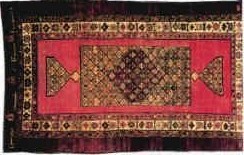|
|
Differences of Weaving Regions
Hamadan has three style of carpet weaving.
First urban weaving, may be seen mostly in Hamadan and sometimes in Malayer. Carpet
weaving in this region has a better organized and more advanced administration, owing to
centralization of market and big merchants of the cities.
Secondly in suburbs of Malayer: Mehrban and Famenin connected respectively to carpet
weaving of Arak (Sarough), Bijar and in some extend to silk weaving of Qom. Carpets have a rather desirable texture and color in addition to having a native identity, an accurate plan and supervised weaving.
Thirdly, there are carpets in the rich expanded miscellaneous field of rustic-tribal regions, usually woven at unique-plan and by memory. They have a limited coloring, thick and lump texture, mostly unit-weft.
There is some standard of texture finesse, handwork images, good dimensions and various features in urban carpets, but less privileges in rustic carpets have their own special
particularities as follows :
Rustic Carpets:
1- Leaning on imaginary designs (usually unique-image)
2- Limited colors ( mostly natural and local colors)
3- Utilizing local-native and coarse wool
4- A chest to chest traditional training
5- Small sizes and dimensions, sometimes variable according to private need and local market
6- Utilizing uni-weft or thick-wefts
7- Gross wale counting maximum up to 25 knots in measuring unit of knot (200 knots in 1/4 zar in local standard)
8- Little polishing and long pile causing heaviness and thickness of carpet
Urban Carpets
1- Utilizing are pre-designed images
2- Utilizing numerous colors, mostly workshop colors and high materials
3- Standard sizes and dimensions
4- Benefiting a training
5- Slightly supervised in texture
6- Fine wale counting, almost higher than 50 knots in knot -unit (200 knots in 1/4 zar in local unit)
7- More polishing and shortening the knot, consequently, lightness of carpet
8- Financial support, though limitedly
9- Having a rather secure market

Zar-i-Nim: 1.12x1.65 (19th century)
|
|

